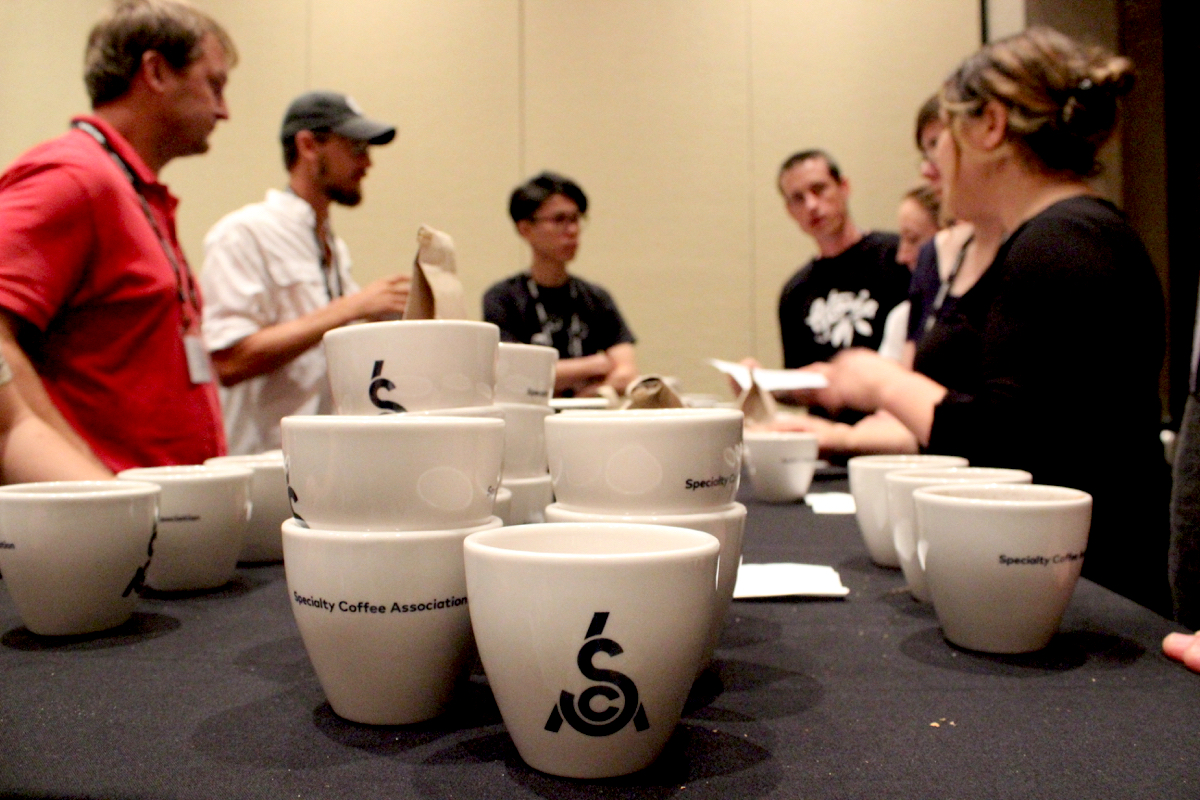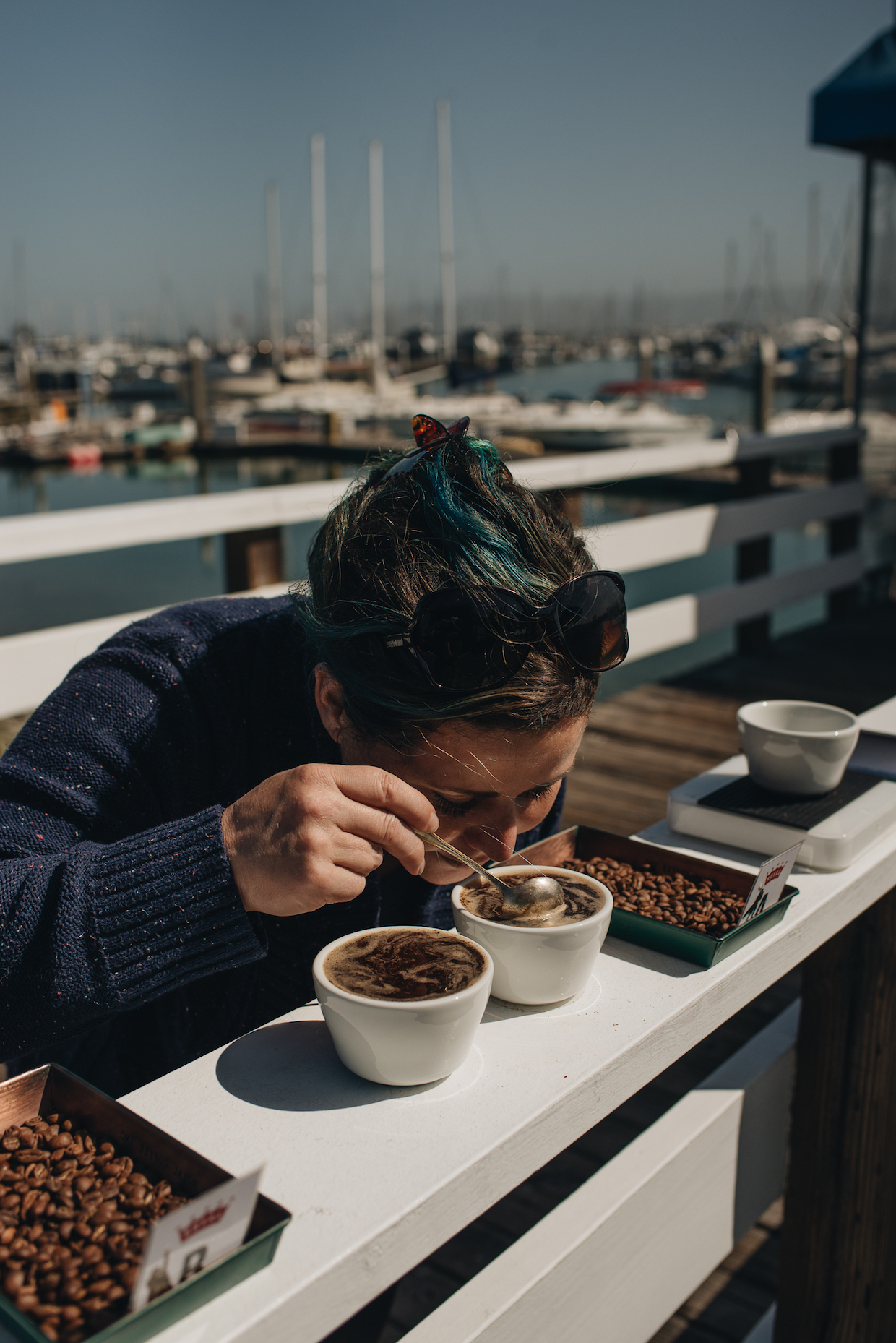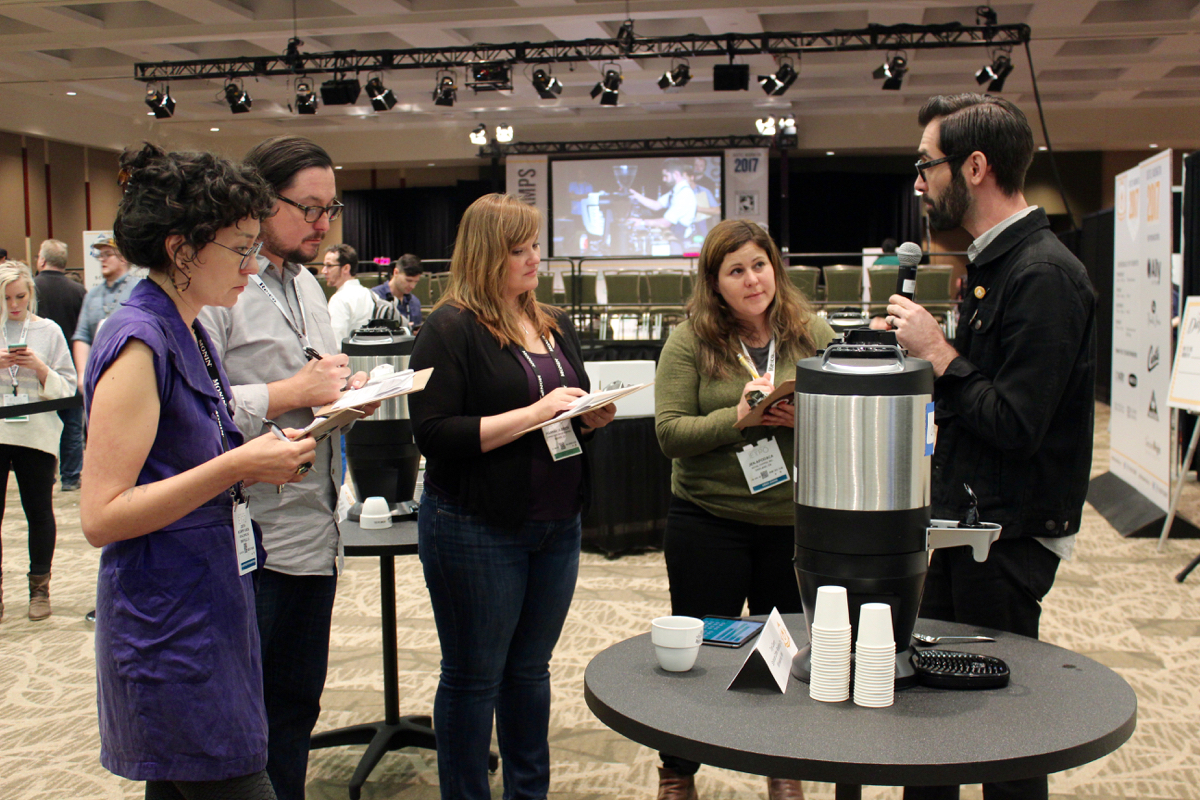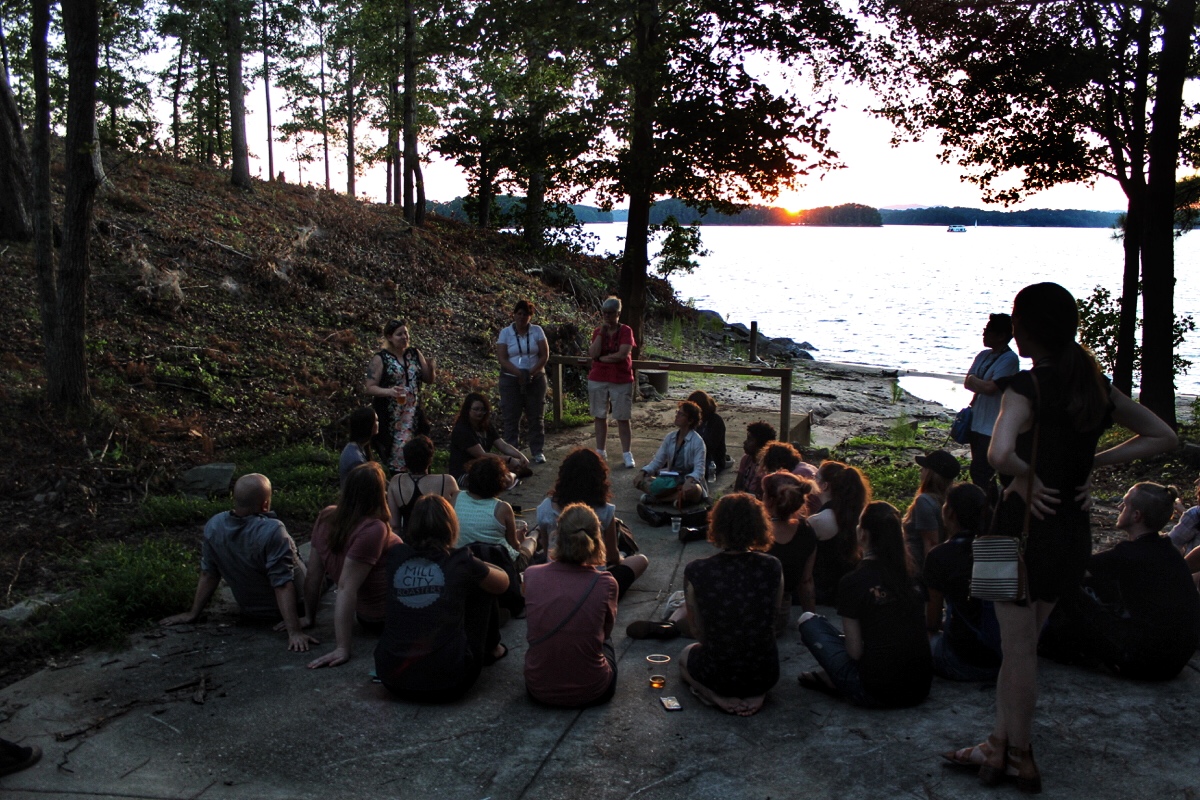Jen Apodaca has been a prominent and inspiring figure in the coffee roasting community for over a decade, challenging the status quo and organizing grassroots efforts to highlight women and other underrepresented groups throughout the industry.
In recent years, while working as Director of Roasting at Royal Coffee‘s lab and tasting room The Crown in the Bay Area, Apodaca has devoted innumerable hours of her free time and energy to initiatives such as #Shestheroaster, which started as an effort to promote and encourage female identifying and non-binary roasters to compete in coffee competitions. Apodaca is also the incoming vice chair of the Coffee Roasters Guild (CRG) and has been serving on the guild’s leadership council since 2015.
Apodaca has roasted coffee for specialty coffee companies such as Ecco Caffe, and later Intelligentsia Coffee & Tea after Ecco was acquired, as well as Blue Bottle Coffee. She has also served as an International Juror for the Cup of Excellence and as the Chair of the Coffee Committee of the Good Food Awards.
We caught up with Apodaca to get some insights into her extensive career in specialty coffee, what drives her, and how she hopes to impact the industry in her leadership role in the CRG.

Jen Apodaca leading a cupping at the 2017 Roasters Guild Retreat. Photo by Lily Kubota/Daily Coffee News
DCN: How did you get your start working in coffee? How did you go about learning to roast?
Jen Apodaca: I started my coffee career when I was 26 as a roasting apprentice at McMenamins Pubs & Breweries in Portland Oregon. My mentor was Dahna Maskell, who encouraged me to read and cup to my heart’s content. In 2004, there was little information available to new roasters. One of the only resources available was the Roasters Guild Forum. It was there that I learned that I was doing everything wrong and my education in the craft of coffee roasting began.
Over the years I have worked for two larger specialty companies that employ large teams of roasters. The experience I have working on a roasting team is the best education a girl can get. Anytime I hit a dead end with a coffee, there was a coworker or two (or five) that I could call for advice. It helped me question why I do things and encouraged me to experiment with the roaster more.
DCN: What have been some of the most rewarding parts of being involved with the Coffee Roasters Guild? What impact do you hope to have during your year as Chair?
JA: This first year as the unified CRG was an eye opening experience and the CRG’s relationship to national chapters and regional roasting groups is crucial to our success. Since we are still in the formative years, I hope to focus our energy and outreach by creating healthy and dynamic communication between our membership and the advisory council. So far the collaboration has been exciting but challenging work. There is a tremendous need worldwide for more coffee roasting resources to reach our membership. Using the experience that we have in Europe and the United States, I hope we can build more events and opportunities in other parts of the world.
DCN: What made you decide to compete in two competitions this year? How was that experience? What were some of your takeaways?
JA: I decided to compete in the [US Roaster Championship] because I have been campaigning for more womxn to compete for the last three years. After four years of judging, I decided it is only fair to put myself in the mix and experience the competition from the competitors’ perspective. As a former judge, I knew I had an advantage and I wanted to share my knowledge of the competition with other female-identified competitors. #shestheroaster and Coffee People Zine held a cupping in Denver on the Friday before the competition to share tasting notes and be there for as much support as folx needed or wanted. Of course, the competition rules changed this year, bringing it more in line with the world coffee roaster competition format, so there was only so much I could do. And of course, I want everyone to do well so I spent time tasting and giving flavor notes to male-identified roasters, as well… I felt more like a coach/supporter than a competitor, which is the role I prefer anyhow.
Signing up for Cup Tasters was a last-minute decision; I knew I would have time and I never competed in it before — figured I would get all of this competitiveness out of my system in one go. Although I cup several times a day, triangulations have always been a different beast for me and they can be very difficult, in my experience. I had the best of intentions to cut down on salty, sweet, and spicy foods as well as practice a few times a week, but life just wouldn’t allow it. I knew that I needed to trust my gut and use all of the senses you use at the cupping table from the smell and aromatics to the actual weight and texture of the coffee in my mouth.
My friend Matt Toomey, who has experience at the national level, told me that while accuracy gets you into the next leg of the competition, speed is the key to winning at the national level. So if you can’t do it fast, then you will not get very far in this competition. That helped me change my strategy and just trust my gut and experience. On the day of my heat, I felt horrible. I was up all night congested and I had lost my voice and considered dropping out of the competition. I could taste a little, but would have to rely mostly on mouthfeel. I think the being sick squashed my anxiety and may have helped me concentrate on the stage. I hope I will be able to do well as a healthy cupper in Kansas City.
I guess my takeaway is that competing in more than one competition is a lot of work, and if I didn’t have friends in the industry help me along and encourage me, I would not have done so well. That said, I had a great time and I feel like I got to share a moment in time with my fellow competitors, which is a unique and special experience.
DCN: In light of your work with #shestheroaster, how was participation this year for women and other under-represented groups in comparison to years past?
JA: I heard from other folks that there were less womxn competing in all of the competitions, but I honestly do not know the statistics. I was delighted to see womxn place in the top three of every competition except the new to the US Coffee in Good Spirits. There is still a long way to go if we want to see more womxn and or poc competing.
DCN: What are some key things that people need to know when roasting for competition to ensure a good outcome for the competitor and/or themselves?
JA: As roasters, we have a process when we evaluate coffee. For someone like myself [who] has always been a production roaster and never an owner or a buyer, this competition can be an extension of your everyday job. You receive a new mysterious coffee and there is a process that you already employ to learn about it and get it ready for the consumer. I recommend staying calm — you got this and you do it all the time. Describe your process for learning about a coffee and the steps it takes to make it delicious. Have lots of people taste your final product and make sure that your flavor notes are accurate (honest).
Three Questions with Jen Apodaca
What inspires you most about coffee?
The people and the relationships we cultivate are the best. I like watching my friends succeed and I love drinking coffee.
What troubles you most about coffee?
So much troubles me about coffee. First, there are too many people that are critical to the coffee supply chain living in poverty — from cherry pickers and smallholder farmers to production workers and baristas. There is too much financial insecurity. Second are people in coffee [who] have it all figured out or think that there is one way to roast or brew.
What would you be doing if it weren’t for coffee?
Ooh, I like this game. I had a lot of different jobs before coffee. I love the efficiency of manufacturing work; I love the number puzzle of bookkeeping; and driving large bulky machinery. If not for coffee, I might have been a butcher or a bus driver. I have a life goal to drive the accordion-style 38 Geary one day.
Lily Kubota
Lily Kubota is the managing editor and digital content manager for Roast Magazine. She is based in Southern California.









Comment